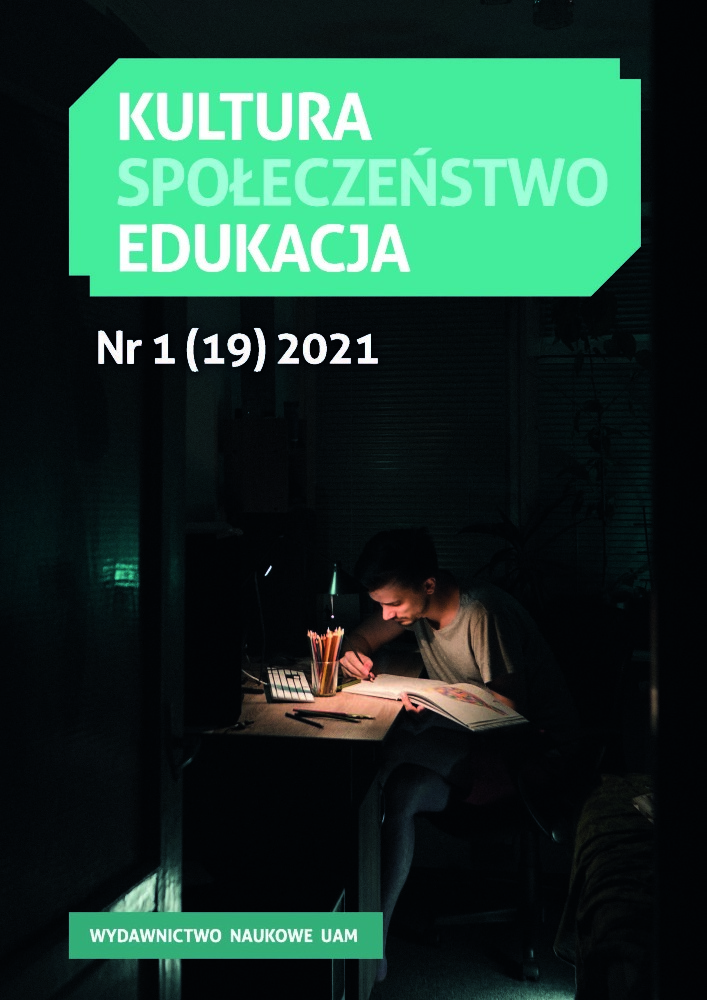Abstract
The religiosity of Polish youth is an important issue that deserves special attention. This fact is confirmed by the observation of new contemporary religious behaviours. The author set herself the goal of examining the level of religiosity among young people and learning how they assess the role of the family in shaping it. To do this, young people were studied for expressed declarative indicators: attitudes towards God, faith and the religious practices they engage in. The assumed goal is achieved and the answer to the questions that were formulated is included in the process of argumentation, which consists of introducing the problem through the analysis of religiosity and its structure, and then an analysis of the author’s own research indicating family determinants of the development of youth religiosity. Its results are similar to those of nationwide research indicating that it is the family, as the closest educational environment of young people, that has the greatest impact on their attitude to faith: it shapes the nature of religiosity, teaches observance of values and is responsible for the frequency of religious practices.
References
Adamczyk T. (2012), Praktyki religijne, [w:] E. Gigilewicz (red.), Encyklopedia Katolicka, t. 16, Lublin, s. 248–250.
Batory A. (2013), Uczucia, [w:] E. Gigilewicz (red.), Encyklopedia Katolicka, t. 19, Lublin, s. 1281–1282.
Chlewiński Z. (1991), Dojrzałość: osobowość, sumienie, religijność, Poznań.
Durkheim E. (1990), Elementarne formy życia religijnego. System totemiczny w Australii, Warszawa.
Finke M. (1996), Pedagogika wiary, Poznań.
Gosztyła T. (2010), Rodzinne uwarunkowania dojrzałej religijności młodzieży, Lublin.
Królikowski P. (2013), Uczucia, [w:] E. Gigilewicz (red.), Encyklopedia Katolicka, t. 19, Lublin, s. 1282–1283.
Mariański J. (1994), Rodzina jako środowisko wychowania religijnego, Przegląd Religioznawczy, 3, s. 59–75.
Mariański J. (2012), Religijność, [w:] E. Gigilewicz (red.), Encyklopedia Katolicka, t. 16, Lublin, s. 1416–1418.
Mastej J. (2012), Praktyki religijne, [w:] E. Gigilewicz (red.), Encyklopedia Katolicka, t. 16, Lublin, s. 248.
Podczasik M. (2014), Rodzina i religijność jej dzieci a stosunek do wiary, Family Forum, 4, s. 163–182.
Prężyna W. (1981), Funkcja postawy religijnej w osobowości człowieka, Lublin.
Skwira P. (2019), Społeczne i rodzinne uwarunkowania postaw religijnych młodzieży licealnej, praca niepublikowana, Lublin.
Stepulak M.Z. (2010), Relacyjny wymiar rozwoju osobowego w systemie rodzinnym, Lublin.
Strzelec M. (1994), Wpływ rodziny na religijność dzieci szkolnych w świetle badań socjologicznych, Przegląd Religioznawczy, 3, s. 125–137.
Walesa C. (2005), Rozwój religijności człowieka, t. I: Dziecko, Lublin.
Wysocka E. (2000), Młodzież a religia. Społeczny wymiar religijności młodzieży, Katowice.
Zaręba S.H. (2010), Rodzina – religia – społeczeństwo, Warszawa.
License
Copyright (c) 2021 Lidia Pietruszka

This work is licensed under a Creative Commons Attribution-NoDerivatives 4.0 International License.

